Concussions are a kind of injury to the brain called traumatic brain injury (TBI). It happens when there is a knock or shake to your head because of pressure or quick movements. Knowing treatment for concussions is very important so that correct help can be given and complete healing achieved. This blog will discuss how concussions are treated in Alliston or Tottenham and beyond, how long it may last without being treated, and the role physiotherapy plays in healing from a concussion.
What Is a Concussion?
A concussion is a brain injury of lower severity that, for some time, interferes with the usual function of the brain. It happens when there’s an impact to the head or body, which results in quick brain movement inside the skull, causing alterations in its chemical balance. Concussions can result from injuries during sports activities, falls, car accidents, and any activity involving sudden jolt or shock. While concussions are usually categorized as “mild,” they can have serious consequences and need appropriate care.
Usually, diagnosing concussions is done by looking at symptoms and complete check-ups. Tests like CT scans or MRIs might not be necessary because these tests cannot always identify a concussion. Signs that somebody has had a concussion can vary from person to person, and they may show up late after someone gets injured.
Recognizing the Signs and Symptoms of a Concussion
Identifying the signs of a concussion is crucial for proper treatment. Some common signs include:
- Headaches: A symptom frequently seen after a concussion, headaches can vary in intensity from low to high.
- Feeling of Dizzy or Problems with Balance: Numerous people experience a sensation of spinning heads or issues in maintaining equilibrium.
- Confusion or Disorientation: A concussion may confuse, cause difficulty remembering events, or cause trouble focusing.
- Nausea or Vomiting: These symptoms may occur shortly after the injury.
- Light or Noise Sensitivity: People who have had concussions frequently report increased sensitivity to light or sound.
- Fatigue: Feeling unusually tired or lethargic is a common symptom of a concussion.
- Mood Changes: Irritability, sadness, or anxiety may accompany a concussion.
- Changes in sleep: often sleeping more or not being able to sleep is reported
If you have any of these symptoms after a blow to the head or body, it’s crucial to get medical help. Sometimes, symptoms may not be present right away, so it’s important to keep an eye on yourself or someone who got hurt.
The Role of Physiotherapy in Concussion Recovery
Physiotherapy in Alliston or Tottenham plays a vital role in treating concussions. Complete rest is rarely required and physiotherapy assists people in recovering entirely and returning to their normal routine. A physiotherapist can lead the recovery process by taking care of both the physical and mental parts of healing.
In recovering from a concussion, physiotherapists aim to restore balance, coordination, and muscle power. They might advise on exercises for dizziness or vertigo, which are usual signs after a person has a concussion. Moreover, they can help enhance neck strength, which usually gets impacted due to the height causing a concussion.
Physiotherapy might also tackle the mental and emotional effects of concussions. For instance, physiotherapists can suggest ways to handle stress, anxiety, or depression that are frequently associated with brain injuries. Some find exercises to enhance cognitive abilities like memory, focus, and clear thinking helpful.
The treatment plan will vary based on how severe the concussion is and what symptoms the person has.
How Long Can a Concussion Last Without Treatment?
If you do not treat a concussion correctly, it may last longer and could even lead to complications. Usually, the impacts of a concussion get better over time with enough rest and care. However, if one does not manage this injury correctly, symptoms can last longer than necessary, slowing down recovery.
Without treatment, problems like headaches, dizziness, and thinking difficulties might continue for weeks or months. Some people can have post-concussion syndrome (PCS), where these problems persist for a longer time, usually more than three months. When concussions are not treated in serious situations, they may lead to lasting mental or physical complications.
Exploring Concussion Treatment Options With Physiotherapy
In treating concussions, physiotherapy provides many advantages that can speed up healing and lower the chances of problems. This is what you can expect when collaborating with a physiotherapist for care after a concussion:
- Rest and Rehabilitation of Body: Relative rest is very important for getting better at first. During this period, you should avoid activities that significantly worsen your symptoms, but continue to try to be active in some ways to give your brain a chance to recover. When you feel ready, physiotherapy professionals can start with soft exercises that will slowly help you regain power and coordination.
- Exercises for Neck: It is common for a concussion to lead to consequences like stiffness or pain in the neck area. This may disturb your balance and overall recuperation process. Exercises that are planned by physiotherapy experts can help you, providing strength and flexibility to the neck during recovery time.
- Training for Balance: Many patients with concussions often face problems related to balance and coordination. Physiotherapists apply balance training techniques to aid in restoring function and preventing falls or damages during the recovery period.
- Rehabilitation for Cognitive Abilities: There may be people who, after suffering a concussion, deal with memory issues or focus. The cognitive rehabilitation approach can aid in enhancing mental clearness and the functionality of the cognitive process through exercises related to memory and different treatments aimed at improving cognitive abilities.
- Slowly Going Back to Activity: When your symptoms improve, your physiotherapist will direct you to slowly return to everyday actions. This phase is critical to ensure you do not hasten your healing process, as it may cause an injury again.
What to Do if You Have a Concussion
If you think that you have a concussion, it is necessary to get medical help as quickly as possible. Here are some crucial steps to take:
- Immediate Relaxation: In concussion recovery’s initial phases, physical and mental rest play a crucial role, though complete bedrest is no longer recommended
- Observing Symptoms: Note symptoms and be aware if conditions are getting worse, such as more frequent headaches or dizziness.
- Stay Away From Heavy Activity: Avoid strenuous physical or mental activity until a healthcare professional gives permission.
- Ask for expert assistance: A medical caretaker or physiotherapist can lead you in the healing journey, ensuring you receive the correct care.
If you or someone you know has suffered a concussion, please contact us at South Simcoe Physiotherapy in Alliston or Tottenham for more details about our physiotherapy treatment services. Our group exists to assist and lead you in every aspect of your recovery journey. Don’t delay—start the healing process today!

